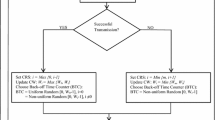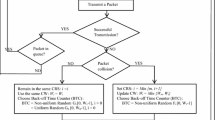Abstract
In contention-based networks, ALOHA and CSMA are the most popular random access protocols, wherein a station transmits packets after a certain delay according to a particular backoff policy, such as binary exponential backoff (BEB). When a contention-based network is heavily loaded, system performance, in terms of transmission success rate and throughput, degrades dramatically under random backoff policies without considering the backoff choices of the neighborhood. To alleviate this problem, we propose and verify in this paper a highly efficient backoff policy, namely “ACK-based adaptive backoff” (AAB), which takes into account the total number of successful packet transmissions (with ACKs) among neighboring stations in determining a station’s subsequent backoff period before its next packet (re)transmission. By doing this, AAB can effectively reduce the overall packet collisions under heavy-loaded conditions, even with hidden-stations. On comparing with BEB and its modified policy, multiple increase linear decrease (MILD), AAB can achieve about 17% and 10% performance gains of transmission success rate under CSMA protocol in a network with 20 stations with new packet arrival rate of 0.9, and 43% and 16% performance gains of energy efficiency respectively when the former two protocols reach their saturated points.
Similar content being viewed by others
References
Lukyanenko A, Gurtov A. Performance analysis of general backoff protocols. J Commun Softw Syst, 2009, 4: 13–21
Demers A, Shenker S, Zhang L. MACAW: A media access protocol for wireless LAN’s. In: Proceedings of ACM SIGCOMM, New York, USA, 1994. 212–225
Song N O, Kwak B J, Song J, et al. Enhancement of IEEE 802.11 distributed coordination function with exponential increase exponential decrease backoff algorithm. In: Proceedings of VTC, Jeju, South Korea, April 2003. 4: 2775–2778
Song N O, Kwak B J, Miller L E. Analysis of EIED backoff algorithm for the IEEE 802.11 DCF. In: Proceedings of VTC, Sept. 2005. 2182–2186
Chatzimisios P, Vitsas V, Boucouvalas A C. DIDD backoff scheme: An enhancement to IEEE 802.11 DCF under burst transmission errors. In: Proceedings of IEEE Sarnoff Symposium, Princeton, USA, 2006. 1–4
Chatzimisios P, Boucouvalas A C, Vitsas V, et al. A simple and effective backoff scheme for the IEEE 802.11 MAC protocol. In: Proceedings of 2nd International Conference on Cybernetics and Information Technologies, Systems and Applications, Orlando, USA, 2005. 1: 48–53
Deng J, Varshney P K, Haas Z J. A new backoff algorithm for the IEEE 802.11 distributed coordination function. In: Proceedings of Sixth International Conference on Fuzzy Systems and Knowledge Discovery, Tianjin, China, 2009. 3: 455–459
Sharma K K, Aggarwal M, Yadav N. Squaring back off based media access control for vehicular Ad-hoc networks. In: Proceedings of the Third International Conference on Soft Computing for Problem Solving Advances in Intelligent Systems and Computing, 2014. 259: 447–455
Angeles R, Rodriguez L, Perez C. Differentiated backoff strategies for prioritized random access delay in multiservice cellular networks. IEEE Trans on Veh Techno, 2009, 58: 381–397
Deng D, Ke C, Chen H, et al. Contention window optimization for IEEE 802.11 DCF access control. IEEE Trans Wirel Commun, 2008, 7: 5129–5135
Bianchi B, Tinnirello I. Kalman filter estimation of the number of competing terminals in an IEEE 802.11 network. In: Proceedings of IEEE INFOCOM, Hong Kong, China, 2004. 844–852
Toledo A, Vercauteren T, Wang X D. Adaptive optimization of IEEE 802.11 dcf based on bayesian estimation of the number of competing terminals. IEEE Trans Mobil Comput, 2006, 5: 1283–1296
He Y, Sun J, Ma X, et al. Semi-random backoff: Towards resource reservation for channel access in wireless lans. IEEE/ACM Trans Netw, 2013, 21: 204–217
Barcelo J, Lopez T, Cano C, et al. Fairness and convergence of CSMA with enhanced collision avoidance (ECA). In: Procceedings of IEEE International conference on Communications (ICC), Cape Town, South Africa, 2010. 1–6
Barcelo J, Bellalta B, Cano C, et al. Towards a collision-freeWLAN: Dynamic parameter adjustment in CSMA/E2CA. Eur J Wirel Commun Netw, 2011, 2011: 708617
Lee J, Walrand J. Design and analysis of an asynchronous zero collision MAC protocol. 2008, preprint arXiv: 0806.3542
Bianchi G. Performance analysis of the IEEE 802.11 distributed coordination function. IEEE J Sel Areas Commun, 2000, 18: 535–547
Tinnirello I, Bianchi G, Xiao Y. Refinements on IEEE 802.11 distributed coordination function modeling approaches. IEEE Trans Veh Techno, 2010, 59: 1055–1067
Kumar A, Altman E, Miorandi D, et al. New insights from a fixed-point analysis of single cell IEEE 802.11 WLANs. IEEE/ACM Trans Netw, 2007, 15: 588–601
Luo J, Jiang L G, He C. An analytical model for SMAC protocol in multi-hop wireless sensor networks. Sci China Inf Sci, 2010, 53: 2323–2331
Malone D, Duffy K, Leith D. Modeling the 802.11 distributed coordination function in nonsaturated heterogeneous conditions. IEEE/ACM Trans Netw, 2007, 15: 159–172
Liu R P, Sutton G J, Collings I B. A new queueing model for QoS analysis of IEEE 802.11 DCF with finite buffer and load. IEEE Trans Wirel Commun, 2010, 9: 2664–2675
Felemban E, Ekici E. Single hop IEEE 802.11 DCF analysis revisited: Accurate modeling of channel access delay and throughput for saturated and unsaturated traffic cases. IEEE Trans Wirel Commun, 2011, 10: 3256–3266
Dai L, Sun X. A unified analysis of IEEE 802.11 DCF networks: Stability, throughput, and delay. IEEE Trans Mobil Comput, 2013, 12: 1558–1572
Harper L. Stirling behavior is asymptotically normal. Annals Math Stat, 1967, 38: 410–414
IEEE standard for information technology. Wireless LAN Medium Access Control (MAC) and Physical Layer (PHY) Specifications, part.11. 2012
Ye S, Tseng Y. A multichain backoff mechanism for IEEE 802.11 WLANs. IEEE Trans Veh Techno, 2006, 55: 1613–1620
Choi J, Yoo J, Kim C. A distributed fair scheduling scheme with a new analysis model in IEEE 802.11 wireless LANs. IEEE Trans Veh Techno, 2008, 57: 3083–3093
Yu H, Qin H H, Li Y Z, et al. Energy-efficient power allocation for non-regenerative OFDM relay links. Sci China Inf Sci, 2013, 56: 022306 (8)
Xu J, Li S C, Qiu L, et al. Energy efficient downlink MIMO transmission with linear precoding. Sci China Inf Sci, 2013, 56: 022309 (12)
Xiang L, Ge X H, Wang C X, et al. Energy efficiency evaluation of cellular networks based on spatial distributions of traffic load and power consumption. IEEE Trans Wirel Commun, 2013, 12: 961–973
Humar I, Ge X H, Xiang L, et al. Rethinking energy efficiency models of cellular networks with embodied energy. IEEE Netw Mag, 2011, 25: 40–49
Author information
Authors and Affiliations
Corresponding author
Rights and permissions
About this article
Cite this article
Yang, Y., Song, G., Wei, K. et al. ACK-based adaptive backoff for random access protocols. Sci. China Inf. Sci. 58, 1–14 (2015). https://doi.org/10.1007/s11432-014-5185-6
Received:
Accepted:
Published:
Issue Date:
DOI: https://doi.org/10.1007/s11432-014-5185-6
Keywords
- backoff policy
- contention-based networks
- medium access control (MAC)
- energy efficiency
- green communications




